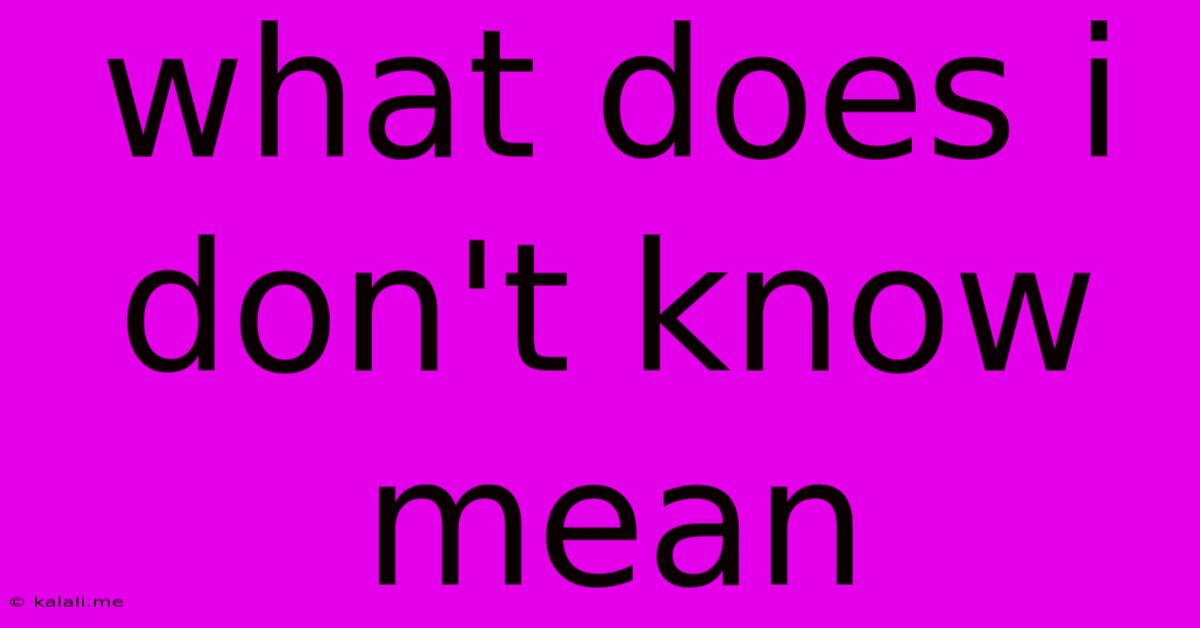What Does I Don't Know Mean
Kalali
Jun 05, 2025 · 3 min read

Table of Contents
What Does "I Don't Know" Mean? A Deeper Dive into Uncertainty
The simple phrase "I don't know" seems straightforward enough, right? But this seemingly innocuous statement carries a surprising amount of weight, depending on context, tone, and the individuals involved. This article explores the multifaceted meaning behind this common phrase, examining its implications in various situations and exploring why it's often more complex than it appears.
Why is understanding the meaning of "I don't know" important? Knowing how to interpret and use this phrase effectively is crucial for clear communication, building trust, and navigating social interactions. Misinterpreting its meaning can lead to misunderstandings and conflict.
Beyond a Simple Statement of Ignorance
While the literal meaning of "I don't know" is a lack of knowledge about a specific topic, the underlying message can vary greatly. The phrase can communicate:
- Genuine lack of knowledge: This is the most straightforward interpretation. The speaker truly doesn't possess the information being requested. This can be followed by an offer to find out the answer or admit a knowledge gap.
- Unwillingness to answer: Sometimes, "I don't know" is a polite way of refusing to answer a question, perhaps due to privacy concerns, sensitive information, or simply not wanting to engage in the conversation. The body language and tone of voice will often reveal this underlying reluctance.
- Strategic evasion: In some cases, the phrase acts as a shield, avoiding a direct answer to a difficult or uncomfortable question. This often occurs in political settings or when someone is trying to avoid accountability.
- Uncertainty and self-doubt: The statement can reflect the speaker's own internal struggle with uncertainty, possibly stemming from a lack of confidence or a fear of being wrong. This nuanced meaning requires careful observation of the speaker's demeanor.
- Intellectual humility: Conversely, "I don't know" can be a sign of intellectual humility, a willingness to admit limitations in one's knowledge. This is often viewed positively, as it showcases honesty and an openness to learning.
Context is Key: Decoding the Message
The context surrounding the statement heavily influences its interpretation. Consider these examples:
- A child asking a complex question: "I don't know" is a perfectly acceptable response, reflecting the child's developmental stage.
- A professional responding to a client's query: "I don't know, but I'll find out for you" conveys professionalism and a commitment to service.
- A witness in a court of law: "I don't know" can have serious legal implications, requiring careful consideration.
The Power of "I Don't Know" in Communication
Learning to embrace "I don't know" can be incredibly powerful. It allows for:
- Building trust and credibility: Honesty about limitations is often more appreciated than providing false or misleading information.
- Encouraging further learning: Acknowledging a knowledge gap creates opportunities for growth and deeper understanding.
- Avoiding potentially harmful assumptions: Admitting uncertainty prevents the spread of misinformation and incorrect conclusions.
In conclusion, the meaning of "I don't know" is far more nuanced than its simple wording suggests. Understanding the contextual cues and underlying intentions allows for clearer communication and stronger interpersonal relationships. Rather than viewing it as a simple admission of ignorance, consider its potential implications as a powerful tool in navigating the complexities of human interaction.
Latest Posts
Latest Posts
-
How To Remove Suit Jacket Lining
Jun 07, 2025
-
Is Taking A Drink To The Bathroom Kosher
Jun 07, 2025
-
Why Cant I Delete News App On Mac
Jun 07, 2025
-
Is It Immoral For Infertile To Have Sex Catholic
Jun 07, 2025
-
Can You Pop Microwave Popcorn On Stove
Jun 07, 2025
Related Post
Thank you for visiting our website which covers about What Does I Don't Know Mean . We hope the information provided has been useful to you. Feel free to contact us if you have any questions or need further assistance. See you next time and don't miss to bookmark.